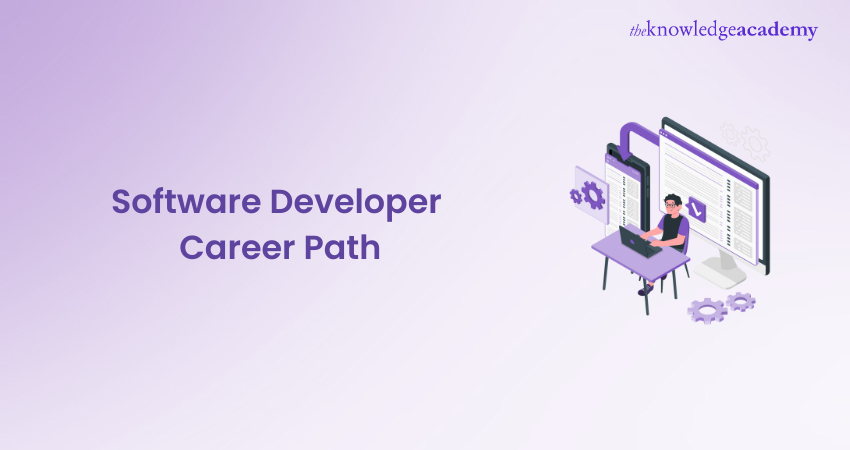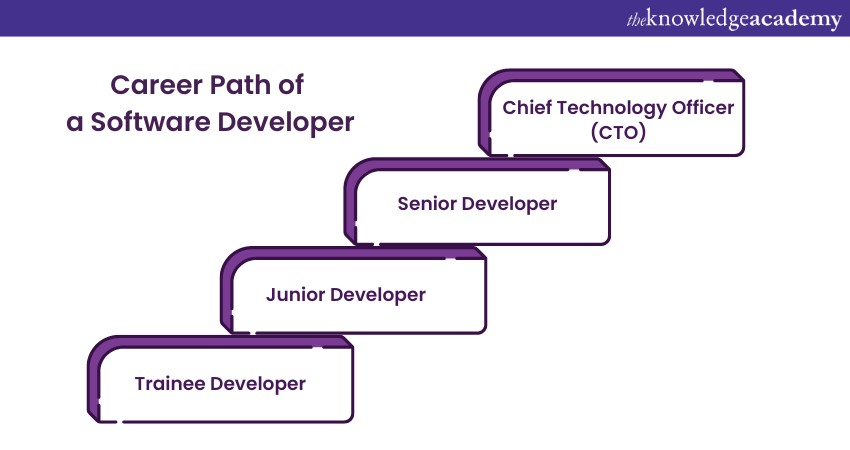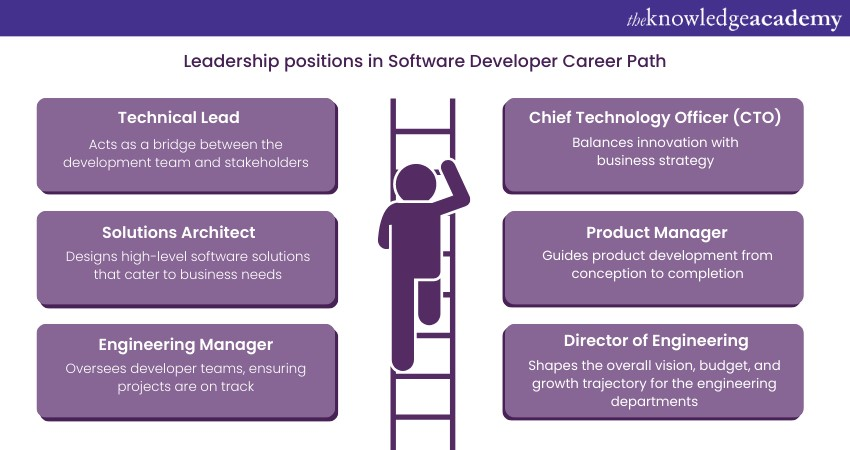We may not have the course you’re looking for. If you enquire or give us a call on 800600725 and speak to our training experts, we may still be able to help with your training requirements.
Training Outcomes Within Your Budget!
We ensure quality, budget-alignment, and timely delivery by our expert instructors.

Are you an aspiring developer for whom charting a career trajectory can seem daunting? If yes, Understanding the Software Developer Career Path is crucial for you if you want to harness opportunities and ensure your sustained growth in this field.
Today, Software Development can stand out as one of the most sought-after and evolving professions. According to Glassdoor, the salary of a Software Developer in the United Kingdom alone is £46,372/yr. So, charting a Software Developer Career Path can be ideal for you.
Want to know how? Read this blog to get a detailed overview of the Software Development Career Path. Also, learn how to lay the groundwork for becoming a Software Developer and more. Read ahead to know more!
Table of Contents
1) Who is a Software Developer?
2) Software Developer Career Path
a) Educational and Skill Prerequisites for Software Developer
b) Junior Developer: The Early Stage
c) Senior Developer: Advancing to the Next Stage
d) Software Developer Specialised Role Selection
e) Leadership Roles in Software Development
f) Continuous Learning in Software Development
g) Alternative Software Developer Career Paths
3) Software Developer Skills
4) Conclusion
Who is a Software Developer?
A Software Developer is a skilled professional essential to creating and maintaining software applications. They can be a versatile professional with coding prowess, adept problem-solving skills, a collaborative mindset, a commitment to ongoing learning, and focusing on making sure of the quality and reliability of software applications. These qualities collectively define the Software Developer Career Path in today's dynamic and fast-paced technological landscape.
Their role encompasses various facets critical to the Software Development lifecycle:
a) Coding Proficiency: They are highly proficient in multiple programming languages, such as Java, Python, or JavaScript. As a result, they can write high-performance and bug-free code—essentially the foundation of Software Development.
b) Abilities to Critically Problem-solve: Much of being a developer is rooted in an aptitude for diagnosing intricate problems and devising real-world solutions. This understanding of problem-solving is important during each development phase.
c) Collaborate and Communicate: Effective teamwork plays a significant role in Software Development. Developers collaborate with team members and must be adept at teamwork, as individual contributions heavily influence overall performance.
d) Learning and Adaptability: The tech landscape is always shifting, so developers must learn new technologies and methodologies consistently. Learning to adapt keeps developers productive and innovative.
e) Code Testing: Beyond writing code, developers also test the software to ensure it is working and complete. This includes ensuring it’s bug-free and the end user has a consistent, reliable experience.
Software Developer Career Path: An Overview

A Software Developer's Career Path is a dynamic progression filled with opportunities, challenges, and continuous learning. From the foundation-laying days of basic programming to the cutting-edge projects, every step in a developer's journey is pivotal.
However, before stepping on the journey to become a developer, you have to select the right programming language for you. You have to understand algorithms or build your first application. Moreover, you must have a creation and problem-solving mindset if you want to become a Software Developer. But these are just the foundational steps; there’s more to the Software Developer Career Path. Let's find out:
Educational and Skill Prerequisites for Software Developer
Before you start your journey as a Software Developer, you must be aware of the following requirements:
a) Formal Education: An engineering diploma or another field of study is typically necessary. Alternatively, you can pursue some of the specialised courses offered at technical schools, which focus primarily on a particular programming language or tool.
b) Certifications: Special certificates (such as for Java, Python, or cloud platforms) can act as your expert certification. If technology is evolving, it may make sense to update your certifications as needed.
c) Core Skills: Sponsor-developed skills include programming language experience with Java, Python, and C++. You should also be able to simplify complex problems and work on a logical solution.
d) Soft Skills: Communication well with team members, stakeholders, and sometimes end-users is paramount. Teamwork is essential in most Software Development projects since collaboration plays a very important role. Critical thinking will also help you understand how to analyse multiple solutions and choose the best course of action.
e) Work Experience: Internships can act as a bridge to the corporate world. They also show that you have the drive and motivation to create your applications or software.
f) Networking: Meeting people helps create job opportunities and build partnerships within the tech industry. Start with eavesdropping online. Most new developers look for a way to break into the community and ask how to improve their coding skills, but merely networking may help more than ever. Answer questions in forums, go to local tech meetups or meetup.com events and join developer communities like Cloud cafe on Slack—where you’ll find other experts willing to help newcomers.
g) Industry Awareness: Develop an understanding of current and emerging technologies, tools, etc. in the industry/framework. Stay updated with new trends so that you are equipped with relevant knowledge until your skills have lifetime value. Otherwise, make sure you know the desires of your market so that when learning new things or taking a course, it is not due to fantasies, budgets, and whims but rather guided by what interests who.
Unlock your potential in the tech world with our Software Development Lifecycle Training.
Junior Developer: The Early Stage
There are several stages before you become a pro in Software Development. Let’s have a look at these stages:
a) Beginner Developer Roles: To become an expert Software Developer, one must gain on-the-job experience while working alongside veteran teams. The initial role is as a Junior Developer, working on smaller tasks with guidance.
b) Skill Refinement: Working on real-life projects provides you with practical knowledge to solve real-life problems and also helps in enhancing your technical skills. You can also ask experienced developers for advice regarding getting some feedback and best practices.
c) Building a Portfolio: Personal projects are critical—they showcase your skills, creativity, and drive as an employee.
d) Collaboration and Team Dynamics: Attend team meetings to learn Project Management tactics you can use in a relevant team. Also, ensure you understand how to work with others on the code using tools like Git.
e) Continuous Feedback: Learn from peers, notice mistakes, and adjust your coding style. It is crucial to identify weak areas and set career goals.
f) Participate in Community Events: Get involved in community events and workshops, hackathons, or network shows. Stack Overflow and similar platforms present a rich trove of questions, solutions, and other things that derive from newly evolving technologies.
g) Understanding Development Methodologies: To handle work efficiently, learn the most popular development methodologies, such as Agile, Scrum, or Waterfall.
h) Specialisation: Your specialisation is based on your interests and market demand. This includes Web Development, Mobile App Development, Backend Systems, etc.
i) Advanced Training: Continue studies related to the niche you want to specialise in, taking courses or obtaining certifications.
Senior Developer:
Advancing to the Next StageThe progression from a Junior Developer to a senior position is not just a journey of technical skills but also one of personal growth, leadership, and an understanding of broader business contexts. Aspiring candidates need to follow this Software Developer Career Path:
1) Consequences of Gaining Experience: With each project, you will see that your understanding of coding, problem-solving, and the intricacies of software design will deepen. Over time, experience becomes an invaluable asset, allowing one to approach problems with seasoned intuition.
2) Technical Proficiency: As the career path for Software Developers advances, you will gain experience in specific technologies or methodologies. This will enable you to tackle more complex projects and challenges. This expertise may span multiple programming languages, frameworks, or architectures.
3) Mentorship and Leadership: After you have transitioned to a senior role, it will often mean guiding junior team members. Mentoring will involve sharing accumulated wisdom, ensuring that best practices are followed.
4) Broadening Horizons: Senior developers often find themselves interfacing with other departments, like marketing or product management, to ensure software aligns with broader business goals.
5) Problem-solving and Innovation: Beyond just coding, if you are a Senior Software Developer, you will be expected to devise innovative solutions. You will also have to optimise existing systems and think strategically about the software’s long-term evolution.
6) Decision- making: As you ascend ranks, you as a developer play a pivotal role in critical decisions, be it selecting a technology stack, determining project timelines, or establishing best practices.
7) Continuous Learning: The tech world is ever-evolving. To maintain your seniority, you, as a developer, must be committed to ongoing education. You also must explore emerging technologies and understand how they fit into the current landscape.
Register now for our comprehensive Software Engineering Training to enhance your technical skills.
Software Developer Specialised Role Selection
Your next step in a Career path for Software Developer is to branch out to specialised roles. Some of these roles are:
1) Full-stack Developer: As a Full-stack Developer, you master both Front-end (user interfaces) and Back-end (servers, databases) Development.
2) Front-end Developer: Focuses on creating visually appealing and functional user interfaces.
3) Back-end Developer: Concentrates on server-side logic, databases, and application infrastructure.
4) Mobile App Developer: Specialises in creating software for mobile devices, like smartphones and tablets.
5) DevOps Engineer: They bridge the gap between development and operations, emphasising tools, automation, and continuous integration/continuous deployment.
6) Data Scientist: Utilises algorithms and data analysis to produce actionable insights from vast data sets.
7) UX/UI Designer: Ensures software is user-friendly, intuitive, and aesthetically pleasing.
8) Quality Assurance (QA) Engineer: Dedicated to identifying bugs and ensuring software quality through rigorous testing.
9) Security Specialist: Focuses on ensuring software is free from vulnerabilities and threats.
10) Game Developer: Combines creativity and technical skills to develop interactive video games.
Leadership Roles in Software Development
After you become a Software Developer and begin to progress in your Career Path for Software Developer, you often ascend into roles that will both test your technical skills as well as your leadership abilities. Here are some examples of the same:

1) Technical Lead: Acts as a bridge between the development team and stakeholders, ensuring projects align with technical specifications and standards.
2) Solutions Architect: Designs high-level software solutions that cater to business needs while ensuring integration with existing systems and scalability for future demands.
3) Engineering Manager: Oversees developer teams, ensuring projects are on track, providing mentorship, and managing personnel.
4) Chief Technology Officer (CTO): Part of the executive team, the CTO sets the technological direction for the company, balancing innovation with business strategy.
5) Product Manager: While not always a technical role, they guide product development from conception to completion. They are also responsible for ensuring that software solutions meet market demands.
6) Director of Engineering: At this strategic level, they shape the overall vision, budget, and growth trajectory for the engineering departments.
Boost team efficiency and adaptability with our Agile Software Development Training. Sign up now to master agile methodologies and deliver better, faster results!
Continuous Learning in Software Development
Being updated is not an advantage; it's now a must for all Software Developers. High-growth individuals prioritise continuous learning; they understand the importance of staying relevant in their careers. Read on further to know how it can help you in your career path:
a) Emerging Technologies: Staying proactive on this front will enable you to be highly adaptable and versatile as new programming languages, frameworks, and tools are released regularly.
b) Industry Trends: It is crucial to know the industry you are entering and which direction it is moving in, such as with Cloud Computing or Artifical Intelligence AI. Being ahead in terms of skills proves beneficial under such circumstances.
c) Certifications: Refreshing yourself on certifications increases what you know and establishes some authority in that area.
d) Soft Skills: Besides proficient technical knowledge, fine-tuning skills like communication, teamwork, and problem-solving are crucial for effective collaboration and leadership.
e) Networking: Chatting with other tech professionals, going to conferences, and being part of a community will give you access inside the bubble to current best practices and innovations.
f) Online Courses and Workshops: Platforms offer education about every field imaginable, ensuring absolute upskilling with ease.
Alternative Software Developer Career Paths
Software Development provides a foundational skillset so that you can have the launchpad for alternative Software Developer Career Paths:
1) Technical Writing: Leveraging coding expertise to create user manuals, documentation, and how-to guides is a good career choice for Software Developer.
2) Tech Consultancy: If you want to be in tech consultancy, then you need to use deep industry knowledge to advise businesses on technology adoption, implementation, and optimisation.
3) Project Management: Overseeing projects from conception to completion, ensuring timelines, resources, and objectives align.
4) Sales and Marketing in Tech: You can also promote and sell technology products, utilising a clear understanding of their features and benefits.
5) Tech Entrepreneurship: You can use your skills as a Software Developer and establish a startup. It is a great way of translating your tech ideas into a viable business.
Software Developer Skills
Software Developer skills relate to everything in software applications, from development and deployment technicalities to communication soft skills.
a) Technical: Primarily programming languages such as Java, Python, C++, ReactJs, AngularJs, and Git. You must also thoroughly know databases, algorithms, and data structures. Moreover, experience in development methodologies such as Agile and Scrum speeds up workflow.
b) Soft Skills: Strong communication and teamwork skills allow you to work effectively with colleagues or stakeholders. Analytical, problem-solving, and critical-thinking skills are essential for solving complex issues effectively. Adaptability and lifelong learning keep developers up to date with new technologies and industry directions.
c) Practical Experience: Internships or personal projects demonstrate initiative and technical skills in practice. Networking is a gateway into tech, with many of the latest opportunities and best practices coming from those who have paved the way.
Conclusion
The Software Developer Career Path is diverse and dynamic. It offers numerous opportunities for growth and specialisation. By continuously evolving, embracing learning, and considering alternative trajectories, you can navigate a fulfilling and adaptable journey in this dynamic tech industry.
Master the art of software design and architecture with our Software Design And Architecture Training.
Frequently Asked Questions

Embark on a Software Development Career Path starting as an entry-level developer. Progress to roles like junior, mid-level, and senior developer. Specialise in web or mobile development, become a team lead, and eventually advance to roles such as software architect or engineering manager.

A bachelor's or master's in IT, computer science, or a related field is essential. Solid programming skills in languages like Java, Python, or C++. Proficiency in Software Development tools and frameworks. Effective communication, problem-solving skills and collaboration abilities are crucial in a collaborative development environment.

The Knowledge Academy takes global learning to new heights, offering over 30,000 online courses across 490+ locations in 220 countries. This expansive reach ensures accessibility and convenience for learners worldwide.
Alongside our diverse Online Course Catalogue, encompassing 17 major categories, we go the extra mile by providing a plethora of free educational Online Resources like News updates, Blogs, videos, webinars, and Interview Questions. Tailoring learning experiences further, professionals can maximise value with customisable Course Bundles of TKA.

The Knowledge Academy’s Knowledge Pass, a prepaid voucher, adds another layer of flexibility, allowing course bookings over a 12-month period. Join us on a journey where education knows no bounds.

The Knowledge Academy offers various Software Engineering Courses including Systems Engineering Training, Software Development and Lifecyle Training etc. These courses cater to different skill levels by providing comprehensive insights into How to Become a Software Tester.
Our Programming and DevOps blogs cover a range of topics related to Software Developer Skills offering valuable resources, best practices, and industry insights. Whether you are a beginner or looking to advance your Software skills expertise, The Knowledge Academy's diverse courses and informative blogs have you covered.







 Top Rated Course
Top Rated Course




 If you wish to make any changes to your course, please
If you wish to make any changes to your course, please


